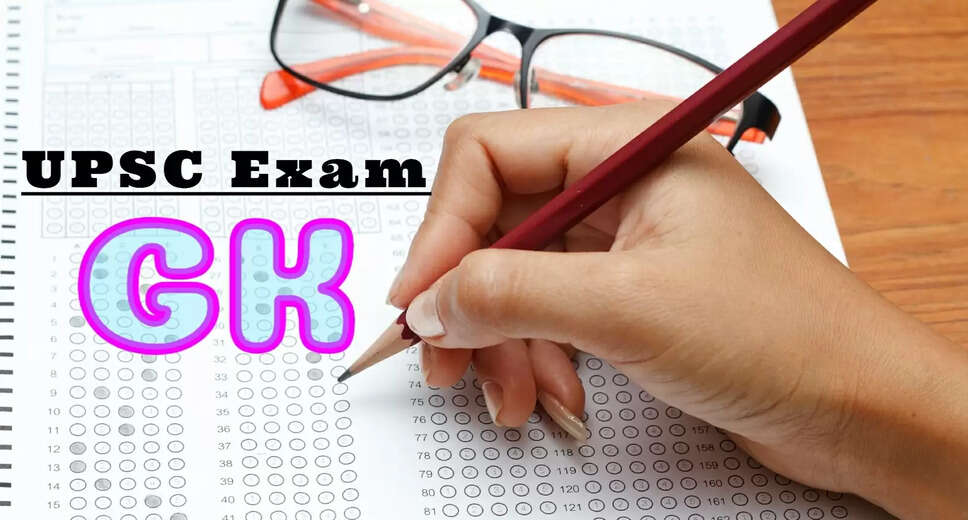Essential UPSC General Knowledge: Economic and Social Development Insights

Understanding UPSC General Knowledge
A comprehensive grasp of various subjects is essential for the UPSC General Studies examination. Questions pertaining to India's economic and social progress are crucial not only for UPSC but also for State PCS, SSC, Banking, and other competitive assessments. This section aids in comprehending India's economic strategies, initiatives, and the government's influence on societal advancement. The UPSC GS and Prelims frequently include inquiries about current schemes, government actions, social metrics, and organizations like NITI Aayog. Topics under Economic and Social Development include Economic Growth, Poverty, Unemployment, Schemes, Education, Health, Women's Empowerment, Sustainable Development, and Inclusive Growth. To excel, it is vital to memorize significant facts, schemes, and statistics. The following 30 key questions and answers will enhance your preparation.
Key Questions and Answers on Economic and Social Development
1. What is the primary aim of economic development in India?
Answer: Sustainable development and poverty alleviation.
2. What does GDP stand for?
Answer: Gross Domestic Product.
3. Who is recognized as the central bank of India?
Answer: Reserve Bank of India (RBI).
4. When was NITI Aayog founded?
Answer: January 1, 2015.
5. Which entity publishes the Economic Survey?
Answer: Ministry of Finance, Government of India.
6. What was the goal of the 'Green Revolution'?
Answer: To boost agricultural output.
7. When did India launch its first Five-Year Plan?
Answer: In 1951.
8. Who regulates the money supply in India?
Answer: RBI.
9. Which sector is promoted by the 'Make in India' initiative?
Answer: Manufacturing Sector.
10. What does Gross National Income (GNI) signify?
Answer: The total income earned by a nation's citizens.
Social Development Questions for UPSC
11. Who is responsible for publishing the Human Development Index (HDI)?
Answer: United Nations Development Programme (UNDP).
12. When was the Right to Education (RTE) Act enacted in India?
Answer: April 1, 2010.
13. What does women's empowerment entail?
Answer: Granting women rights, opportunities, and self-sufficiency.
14. Who benefits from the Ayushman Bharat scheme?
Answer: Health insurance for the economically disadvantaged.
15. Which committee established the poverty line in India?
Answer: Tendulkar Committee.
16. What is the aim of the MGNREGA scheme?
Answer: To create job opportunities in rural regions.
17. What is the primary goal of the National Girl Child Scheme?
Answer: To ensure the education and safety of girls.
18. What does the Skill India Mission aim to achieve?
Answer: To equip youth with employable skills.
19. What was the purpose of India's Population Policy 2000?
Answer: To manage population growth and enhance health.
20. What does the UDAN scheme focus on?
Answer: Enhancing regional air connectivity.
General Knowledge Questions on Economic and Social Issues
21. What is sustainable development?
Answer: Development that harmonizes environmental, social, and economic factors.
22. What is the aim of the social security scheme?
Answer: To support the elderly, disabled, and impoverished.
23. When was the 'Digital India' initiative launched?
Answer: July 1, 2015.
24. What does the 'Swachh Bharat Mission' focus on?
Answer: Sanitation and toilet construction.
25. When was the Ministry of Women and Child Development formed?
Answer: In 2006.
26. What is the main goal of the 'Jan Dhan Yojana' initiated by the Government of India?
Answer: To ensure banking access for all.
27. How do GDP and GNP differ?
Answer: GDP measures total output within a country, while GNP accounts for total income of its citizens.
28. What are the key social indicators in Indian society?
Answer: Literacy rate, sex ratio, and mortality rate.
29. By what year does India's population policy aim to achieve a TFR of 2.1?
Answer: By 2010, with a goal to stabilize the population by 2045.
30. Which initiative aims for universal education access?
Answer: Sarva Shiksha Abhiyan (SSA).
